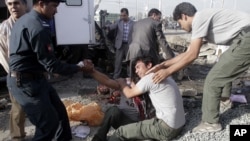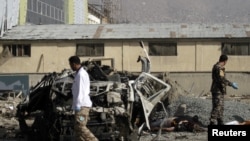JOHANNESBURG —
Eight South Africans were among those killed Tuesday in a suicide blast in Afghanistan's capital. An Afghan insurgent group says the attack on a mini-bus carrying foreigners was in response to an anti-Islam on-line video that has sparked worldwide protests. But South African officials and a Muslim analyst say the attacks were probably not aimed at South Africans.
The bomb ripped through the van near Kabul’s airport on Tuesday morning, killing at least 12 people including the eight South Africans.
The Afghan insurgent group Hezb-e-Islami claimed responsibility for the attack, saying it sent a female bomber in response to the anti-Islam video that has set off protests all over the world, including in Afghanistan.
The protests are directed against the American-made film called “Innocence of Muslims” that mocks Islam’s Prophet Mohammed.
Nelson Kgwete, is a spokesman for South Africa’s Department of International Relations and Cooperation:
“We understand from our mission in Islamabad that the eight South Africans were employed by a private aviation company," said Kgwete. "At the moment the department has the complete list of all the names of the deceased. We are working on establishing contact with the next of kin and also ensuring that we ensure the necessary consular assistance to the families. As government we would like to express our deepest condolences to the families, friends and colleagues of the deceased. At the moment it’s difficult to say what the motive may have been or whether or not this was a targeted attack, we do not have that indication at the moment.”
South African Foreign Ministry spokesman Clayson Monyela said the attack was likely a result of “mistaken identity.” He did not say who the attackers may have meant to strike, but previous protests have targeted Americans.
Last week, protesters attacked the U.S. Embassy in Cairo and the U.S. Consulate in the Libyan city of Benghazi. U.S. Ambassador Chris Stevens was among four Americans killed in the attack in Benghazi.
Monyela said South Africa’s government did not anticipate unrest at home over the film. The country is no stranger to violent protests - the mineral-rich nation is in the midst of more than a month of illegal strikes in the mining sector that have resulted in dozens of deaths.
Naeem Jeenah, executive director of the Johannesburg-based Afro-Middle East Center, says South Africa’s 1.5 million Muslims are unlikely to take up the torch as Muslims have in Libya, Tunisia and Egypt.
“I don’t think that in some of these countries like in South Africa, that video has been tied in as closely to a broader anti-American sentiment as it is is in North Africa. I’m not saying that sentiment doesn’t exist, because there certainly is a strong anti-American sentiment in South Africa, not only among Muslims. But there’s more likelihood that you’d get an angry anti-American protest taking place after a drone attack than this video," said Jeenah.
Jeenah says Muslim clerics in South Africa have also urged restraint and calm -- though they have condemned the video. He also says the video has not been marketed as aggressively in nations with substantial Muslim populations like Kenya, South Africa, or Nigeria.
Jeenah says he has not made the effort to see the film, though it is available in South Africa and, he says, it is not forbidden for Muslims to watch films that criticize Islam.
Both Pakistan and Bangladesh have reportedly blocked access to YouTube because of the video.
“I haven’t watched it because I really am busy and don’t have the time to look at stupid things," said Jeenah.
Jeenah also says the protests are happening in North Africa partly as a result of the Arab Spring movements in which the people managed to sweep out longtime leaders last year.
“One of the reasons why it has taken off as it has in North Africa is certainly as a result of the kind of democratization wave that has taken place there. If this whole video story had taken place two years ago, you wouldn’t have had these types of protests in Libya, Tunisia or Egypt. Certainly in Libya, it would only have happened if Gadhafi allowed it to or if Gadhafi organized it. In Egypt, it would be crushed, in Tunisia it wouldn’t have happened," he said.
The U.S. State Department has ordered all non-essential American personnel and family members to leave Tunisia after protesters there entered the U.S. Embassy and destroyed cars and trashed buildings. The State Department issued a similar warning in Sudan over concerns that there are terrorist groups working in the nation. The State Department has also cautioned U.S. citizens against traveling to either nation.
The bomb ripped through the van near Kabul’s airport on Tuesday morning, killing at least 12 people including the eight South Africans.
The Afghan insurgent group Hezb-e-Islami claimed responsibility for the attack, saying it sent a female bomber in response to the anti-Islam video that has set off protests all over the world, including in Afghanistan.
The protests are directed against the American-made film called “Innocence of Muslims” that mocks Islam’s Prophet Mohammed.
Nelson Kgwete, is a spokesman for South Africa’s Department of International Relations and Cooperation:
“We understand from our mission in Islamabad that the eight South Africans were employed by a private aviation company," said Kgwete. "At the moment the department has the complete list of all the names of the deceased. We are working on establishing contact with the next of kin and also ensuring that we ensure the necessary consular assistance to the families. As government we would like to express our deepest condolences to the families, friends and colleagues of the deceased. At the moment it’s difficult to say what the motive may have been or whether or not this was a targeted attack, we do not have that indication at the moment.”
South African Foreign Ministry spokesman Clayson Monyela said the attack was likely a result of “mistaken identity.” He did not say who the attackers may have meant to strike, but previous protests have targeted Americans.
Last week, protesters attacked the U.S. Embassy in Cairo and the U.S. Consulate in the Libyan city of Benghazi. U.S. Ambassador Chris Stevens was among four Americans killed in the attack in Benghazi.
Monyela said South Africa’s government did not anticipate unrest at home over the film. The country is no stranger to violent protests - the mineral-rich nation is in the midst of more than a month of illegal strikes in the mining sector that have resulted in dozens of deaths.
Naeem Jeenah, executive director of the Johannesburg-based Afro-Middle East Center, says South Africa’s 1.5 million Muslims are unlikely to take up the torch as Muslims have in Libya, Tunisia and Egypt.
“I don’t think that in some of these countries like in South Africa, that video has been tied in as closely to a broader anti-American sentiment as it is is in North Africa. I’m not saying that sentiment doesn’t exist, because there certainly is a strong anti-American sentiment in South Africa, not only among Muslims. But there’s more likelihood that you’d get an angry anti-American protest taking place after a drone attack than this video," said Jeenah.
Jeenah says Muslim clerics in South Africa have also urged restraint and calm -- though they have condemned the video. He also says the video has not been marketed as aggressively in nations with substantial Muslim populations like Kenya, South Africa, or Nigeria.
Jeenah says he has not made the effort to see the film, though it is available in South Africa and, he says, it is not forbidden for Muslims to watch films that criticize Islam.
Both Pakistan and Bangladesh have reportedly blocked access to YouTube because of the video.
“I haven’t watched it because I really am busy and don’t have the time to look at stupid things," said Jeenah.
Jeenah also says the protests are happening in North Africa partly as a result of the Arab Spring movements in which the people managed to sweep out longtime leaders last year.
“One of the reasons why it has taken off as it has in North Africa is certainly as a result of the kind of democratization wave that has taken place there. If this whole video story had taken place two years ago, you wouldn’t have had these types of protests in Libya, Tunisia or Egypt. Certainly in Libya, it would only have happened if Gadhafi allowed it to or if Gadhafi organized it. In Egypt, it would be crushed, in Tunisia it wouldn’t have happened," he said.
The U.S. State Department has ordered all non-essential American personnel and family members to leave Tunisia after protesters there entered the U.S. Embassy and destroyed cars and trashed buildings. The State Department issued a similar warning in Sudan over concerns that there are terrorist groups working in the nation. The State Department has also cautioned U.S. citizens against traveling to either nation.





